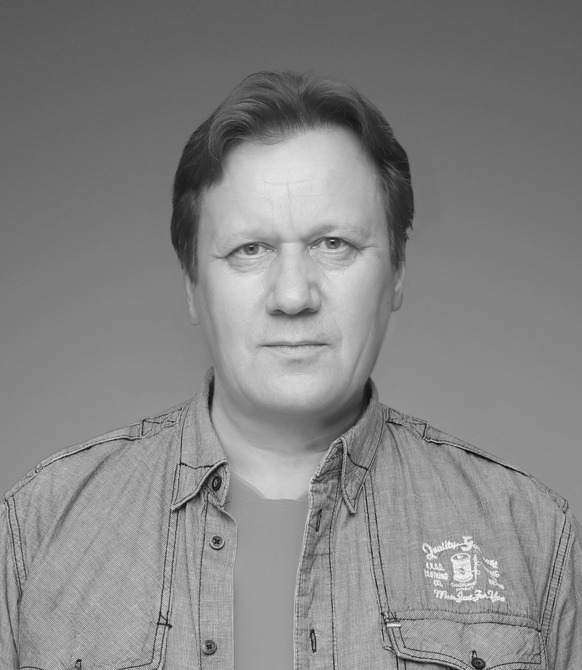
Страна : Канада
Закончил УральскийАрхитектурно-Художественный Университет (1990) и University of Liverpool (1992) В настоящий момент живет и работает в Торонто, Москве, Амстердаме, Шанхае. Несколько лет работал художником-постановщиком и креативным директором на Киностудии «Страна», «Forrec» и «Sanderson». Как журналист сотрудничал с журналами: «Вещь-Док», «Move», «Стольник», «Архитектон» Автор нескольких книг, последняя вышла в издательстве АСТ/Ультракультура/У-фактория («Дом, который построил Майк» ), Кабинетный Ученый(«Кулуангва. The Ball.»), Издательские Решения («Polaroid»,»SIX», «Казочки»).
Country : Canada
Michael Ouzikov graduated from the Ural Architectural and Art University (1990) and the University of Liverpool (1992). He currently lives and works in Toronto, Moscow, Amsterdam, and Shanghai. For several years he worked as a production designer and creative director at the Film Studios «Strana», «Forrec» and «Sanderson». As a journalist, he collaborated with the magazines: «Thing-Doc», «Move», «Stolnik», «Architecton» Author of several books, the last one was published in the publishing house AST/Ultraculture/U-factoria («The House that Mike built»), An Armchair Scientist («Kuluangva. The Ball.»), Publishing Solutions («Polaroid», «SIX», «Kazochki»).
Перевод прозы “Кулуангва. The Ball.“
…an oyster does not know to whom its pearl belongs.
Confucius
“Come to the edge,” he said.
“We can’t, we’re afraid!” they responded.
“Come to the edge,» he said.
“We can’t, we will fall!” they responded.
“Come to the edge,” he said.
And so, they came.
And he pushed them.
And they flew.”
Guillaume Apollinaire
PROLOGUE
“Misha! Misha! Misha! Come down and play football with us! Come on – you sleepy head!”
“Hey! You boys, get away from my car!
Do not lean against the car, you rascals! Step away from my car!”
“What are you yelling at the boys for, Rudolf Samuilovich!? Who needs your shitty rust bag?” The matriarch then turned her attention to the persistent boy in the courtyard below her balcony,
“Hey boys, Misha is sleeping! He went fishing early in the morning with his father. They returned late. Go kick around without him.
Come back after lunch, maybe he’ll be up by then. Or why won’t you play tomorrow – you’re on holiday anyway!”
“Okay, Aunt Rita!”
“Boys, get away from my car!”
CHAPTER 1
70° 4’ 36” — North
170° 51’ 20” — East
Chaunsky District,
Chukotka,
Russian Federation
67 kilometers north of the village Vumalka
November 4, 1997
…One hundred and twenty-seven… one hundred and twenty-eight… one hundred and twenty-nine… one hundred and thirty… forgive me, I can’t go on. Allow me to rest… just like yesterday, and maybe two days ago, or three… and, most likely, two hours ago. Who can keep track of this stalled time? And my path, stalled in these blizzards… After all, we’re only people. And people are not sand – we can go against the wind while we have strength. I’m philosophizing again. Just shut up and move… one hundred and thirty-one, one hundred and thirty-two… A little more to one hundred and forty steps… and to sleep…
Dressed in overalls resembling a diving-suit made of papier-mâché, the man was trudging through a violent snowstorm, through the drifts, the bitter cold and impenetrable darkness, muttering under his breath words understandable only to himself. Not looking ahead or to the sides, he walked as if on a tried and tested path. The wind tore away loose scraps of feathers out of his suit.
One hundred and thirty-three…
The man paused wearily. Kuluangwa, let’s agree that tomorrow I will walk seven more steps than today. Right now, I must lie down, I just have to…
Turning away from the wind, he clumsily fell sideways into a snowbank and tucked his knees in, firmly bracing himself with his hands as if dreading to fall apart. The cyclone immediately began to cover his whole body with snow – his shoulders, his head in an odd, baggy hood, his legs in shapeless pants torn at the knees, and his odd-looking leather bag that was caught around his back by straps of leather.
One hundred and thirty-four…
With his ice-cold hands, the man ripped his paper suit at his chest and pulled out a black ball of thread. Or was this a coconut? No, this sphere was neither an object of folk art nor an exotic fruit. It was a black, slightly formless… football? Someone clearly had a bite of it. On its sides were grooves that could’ve originated from an invasion of diligent field mice. Also, there was a small round stamp with the image of a strange dancing man fringed by a braid of obscure characters. These kinds of stamps are used to sear cattle and horses before they join a herd.
One hundred and thirty-five…
The spherical object lived its life in the stiff hands of the traveler. It seemed as if it exuded hot air. The snow melted before it could reach the tired man, enveloping his chest, face, and weathered hands with white steam. The drifter threw his head back, releasing it from underneath the hood and revealing an emaciated face dried-up to the bones, a ragged beard, and colourless hair glued to his forehead. However, his sunken, discoloured eyes were full of light. With the fumbling fingers of his right hand, he sent a pinch of stinging snow to his mouth. He coughed. Once again, throwing his head back, he suddenly hit his neck on something hard and muttered, “…one hundred and thirty-six…” Turning abruptly with all his strength, the man began to dig out the snow behind his head. Quickly, his fingers came upon the black basalt. Grabbing the ball with both hands, he pressed it against the cold stone and whispered, “Kuluangwa, my brother, look! We’ve come, my dear! You were right! This is your Big Land! I did it, just like you wanted – I did it! You did it!”
One hundred and thirty-seven… one hundred and thirty-eight… one hundred and thirty-nine…
Tightly clenching the ball, he pressed his back to the basalt and wept. Meanwhile, a storm carrying masses of snow from the Chukchi Sea continued to form a snow-den around the traveler. Only his head and hands holding the ball on his chest remained uncovered. The ball continued to melt the snow around him. With a detached look, the wanderer investigated the snowy whirlwind over his head, in what was once the sky. His parched lips whispered, “You know what, tomorrow I will not go anywhere, brother Kuluangwa. The next one hundred forty paces you’ll have to roll yourself.” The wanderer sagged again and was coughing, but now from barking with laughter. Thank you, my dear, for bringing me to this boulder… as Alexander Pushkin would say, “That’s where my grave lay…” A gust of wind tore holes in the hood, releasing gray fuzz. Mingled with the snow, the fluff descended onto the surface of the black ball and suddenly became sparks in a blue flame, like mosquitoes over an old kerosene lamp.
Burning right through the soaked-through paper-suit, the ball slowly melted into the traveler’s chest and pulled off the dry skin with an angry burn, exposing the poor man’s pink ribs. But the wanderer did not groan; he merely shuddered without stirring, shaking off the ashes of paper and downs. The man was dead. In his glass eyes, the snowstorm fell apart for a moment, revealing a clear starry sky unexpectedly painted in emerald green.
Then again, the blizzard closed the curtain and finally swept the motionless body. The ball, which was tightly pressed to the man’s corpse, slowly began to cool down and soon turned into a black, heavy rock.
One hundred and forty…
Meanwhile
Coast of the Chukchi Sea
“Hunting has become so bad here…”
“Another day or two of this blizzard, and you can forget about hunting.”
“Just look at how heavy this storm is! It’s been a while since something like this.”
Two Evenks, in heavy, long-skirted reindeer suites, were talking inside a small dwelling quietly, as if afraid of frightening someone away. Their palms were reaching out to the hissing flames of the kudlik. Their narrow eyes gleamed with each oscillation of the flame. In a hole near the ceiling the wind was singing like the howling of wolves. It was cold. The rare snowflakes that made it inside by flying through the ceiling-hole hissed in the fire.
Out of nowhere, a hollow voice behind the stretched-skin wall woke the reindeers. Two huskies in a corner pricked up their ears.
“What is it?” one of the hunters fretted. “There have never been bears or wolves here. I’ll go take a look.” He crept out, nearly getting his rifle tangled in the skins hanging in the shelter.
Upon returning, he told to his companion: “In the morning, we must go. Have you seen the sky? It’s green… damn green! The storm is coming. The big storm.”
“Yes, this is a bad place…” said the second hunter while patting the scruffy huskies and squinting into the flames. “We’ll sleep now and take off in the morning. How are the animals?”
“Oh, what the hell can happen to them?”
Just a few dozen steps remained for the unfortunate traveler in order to reach the snow-covered tent of the native nomads from the village of Vumalka.
The howl of the husky resonated: Oooooooo! Uuuuuuuu!
CHAPTER 2
20° 40’ 25” N
88° 34’ 31” W
Chichen-Itza, Yucatan Peninsula, Mexico
October 2, 1520
Oooooo-aah-oo-oo-oo-oo… Her eyelids parted heavily. But the picture before her eyes was indistinct. There were yellow-green flashes of light through the milky haze of age. She did not immediately realize why she was awakened, whether it was because of the deaf groans from the depths of the hut or from ordinary kicks in the womb. The kicks have recently become more frequent. The child felt the lack of water in the mother’s womb and demanded liquid. This will be Tolana’s first childbirth, but she did not know how to soothe a fragile fruit. Her husband’s mother Ma-Is, was an old woman and could barely move a leg. Surprisingly, she was still on her feet! Almost all her peers were old women, who were teachers of the tribe and supervised the tribe’s younglings. One after another, these women simply dried up in the eyes of Tolana over the past three weeks. Each morning, they hung out coloured blankets at the doors of their huts, giving the sign that they were still alive. Then they went back inside and lay motionless in the dry vacuum until sunset. Where no signal was hoisted, the priest of the tribe of Vak Balama sent two warriors. Wrapped in blankets, the dead were carried past the Place of One Thousand Columns and past the Temple of Chtuloq to the end of the cornfield that had not harvested crops. The bodies were cast and covered by piles of stone to prevent wild animals, mad from heat, hunger, and thirst, from ripping apart the corpses. Every corpse lay on top of old graves, and again everything was buried by stones. A foul stench was all around. The warriors covered up their faces, leaving only a slit for the eyes.
At night, the burial mound was surrounded by burning torches, cries scared off animals, the trunks of dead trees were beaten by beetles, and drums were banged.
Tolana woke up every morning before dawn, carefully straightened her shoulders and clasped her hands at the waist, making steps like a duck to go to a thicket near the village surrounding the city wall to collect the dew drops on the broad leaves of ol-ka-hyo. Large drops were shaken off into the flat clay dish, while small drops were simply licked by the tongue. An hour later, her tongue swelled. And so – every morning for the past four moons was like this. There was no other water.
The child inside her demanded water and food. He wanted to live. According to the prediction of the old grandmother, not much time was left until its birth – only two moons. Walking became increasingly difficult for Tolana. Initially, she could reach the Sacred Cenote by carefully treading barefoot on stone-like scorched earth. She approached the edge of the sinkhole and stared intently into its depths. Has the water come – have the gods become kind? But the same sweet smell of rotting corpses hit her nostrils – the poor girls, among which was her little sister. Tolana was taken aback by disgust, felt sick, and in recent days threw off her trips to the dead cenote.
She wanted to immediately gather the morning moisture from the leaves, but the sun was already high and Tolana realized that she overslept. She felt her tongue being torn by sharp pain. Caressing her face with the palm of her hand, she felt the scab of dried blood. Two fingers reaching the swollen tongue, Tolana touched the scar in the middle. Although it had healed, each movement of the tongue caused pain. Pain was also present in her large stomach, already beginning to sink down – a sign of labour approaching. Tolana leaned her head, moving it side to side, trying to shake off the numbness and restore the events of yesterday. Pain anywhere else did not respond, as it lived only in the stomach and at the tip of her tongue.
Gentle rustling and moaning made her look around, and Tolana recognized the source of these sounds – in the corner of the hut, on old rags and covered with a striped blanket, her husband, Kuluangwa, was moaning. The entire lower part of the blanket was covered in spots of dried blood. Kuluangwa lay on his back and hazily whispered something. Tolana stooped below to parse the words of her husband.
“Tomorrow… everything will be fine! Vak Balama said that, remember? Tomorrow will rain… Chaak has already drank. We did it… He is now satisfied. He shall give us water. He should… our child.” The man’s voice broke and died.
“Yes, Kuluangwa,” said Tolana, barely moving her swollen tongue.
She put her head on her husband’s chest and closed her eyes. Memories of yesterday flashed in her head. She remembered the parable that the high priest Vak Balama told them yesterday in the temple.
The path chosen by the other tribes was one of defeat, giving away all that they had under their chests and armpits, so that it would blossom. Such a bloom meant that each tribe that was brought as sacrifice for Chaak had their hearts ripped out. But before that, Chaak conveyed his powers to the Balama clan – Balama-Quitzé, Balama-Aqaba and Iki-Balama… my glorious ancestors. He transmits this force to this day and this power has never deceived us. We are accustomed to abstaining from food while awaiting dawn. We are awake, waiting for sunrise. We guard the Great Star that rises first before the sun when the day is engaged. Our gaze is fixated on there – the sunrise. There, from whence came our gods.
But that was not where we got our power and sovereignty from. We conquered and subdued the large tribes and small tribes when we offered them as sacrifice to Chaak and the Holy Grain. We offered him the blood, flesh, chest, and armpits of all those people in order to water and to revive the Holy Grain. And a great power has come to us. Great was our wisdom when we accomplished our deeds in the dark. But then came a time when Chaak demanded more. It was not enough for the Holy Grain of Chaak. Our offerings were not enough for the one of the six sacred grains that He brought to our land. And He said to me – and I to you, “Children of the Corn, express your gratitude before your last exodus! Do what is necessary – prick your ears, pierce your loins, and commit your sacrifice! That will be your gratitude in front of me — and I will repay you.” And I, Vak Balama, your priest, tell you – it is time to do everything that Chaak wants for the irrigation and flowering of the Holy Grain.
Tolana also remembered for how long, how awfully long, she dragged Kuluangwa across the narrow steps down from the top of the temple. She remembered how hard the child fought in her womb, resisting every strain of the mother. The warm hands of old Ma-Is helped drag Kuluangwa into the hut, put his limp body into the corner on a low couch and covered him with a blanket. But what came before this? Her memory was confused, and she could not recall the events. Kuluangwa was breathing hoarsely, while Tolana’s head rose and fell with his every sigh. Then he stretched with a groan, exhaling pain, straightening his muscles that had stiffened at night. The blanket harbouring his body slipped to the floor and Tolana looked up, not fully realizing what had opened in front of her. She gasped. What she saw made her tightly shut her eyes. Kuluangwa’s entire lower body was covered with scabs of dried blood – his legs, hips, ankles, and feet. A large, ugly, black, and red body part faintly trembled between his legs like a sponge. What once took an active part in the tender creation of a small creature in her womb had turned into an unimaginable nightmare. And now Tolana remembered yesterday.




 (84 оценок, среднее: 4,71 из 5)
(84 оценок, среднее: 4,71 из 5)![]() Загрузка…
Загрузка…

